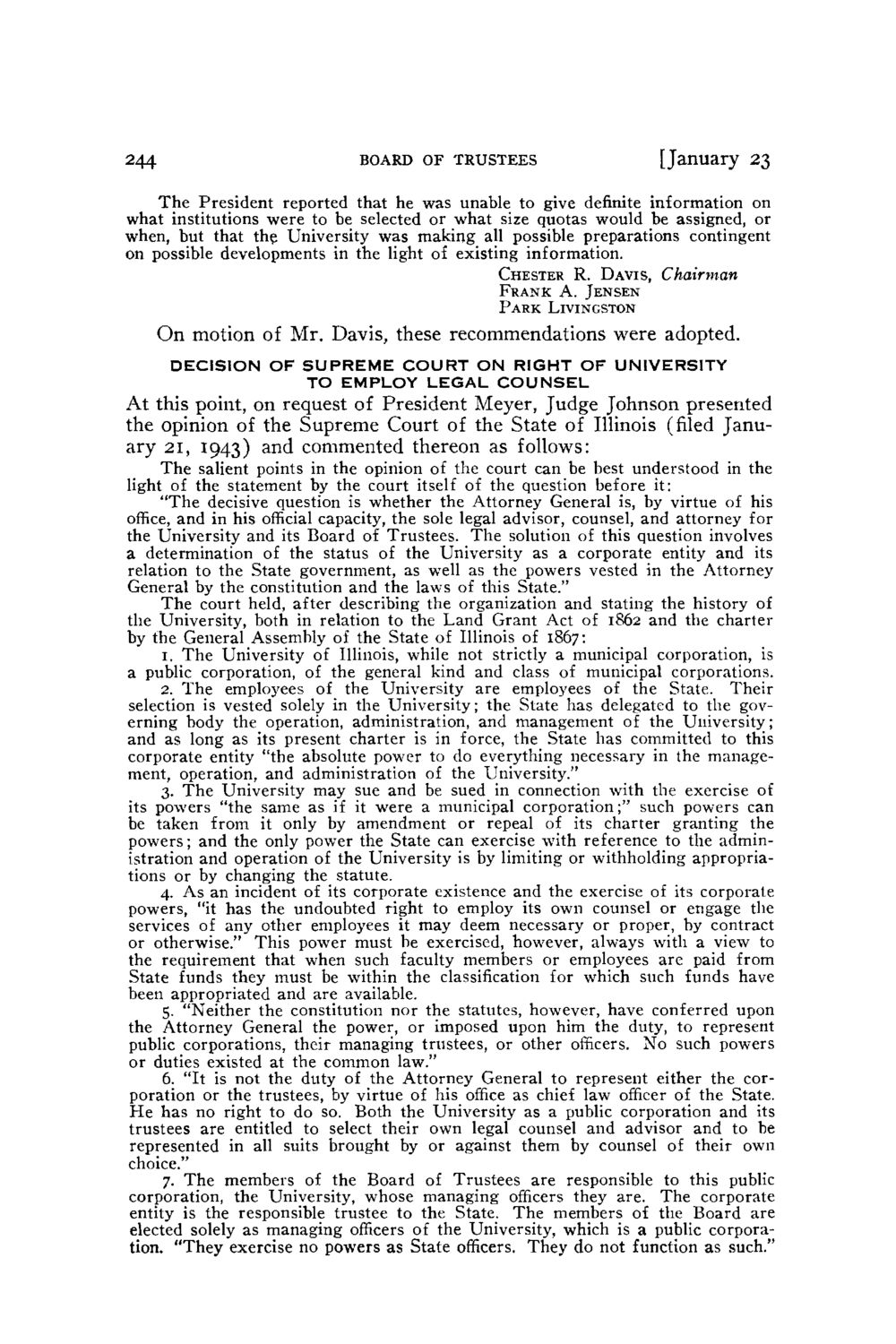| |
| |
Caption: Board of Trustees Minutes - 1944
This is a reduced-resolution page image for fast online browsing.

EXTRACTED TEXT FROM PAGE:
244 BOARD OF TRUSTEES [January 23 T h e President reported that he was unable to give definite information on what institutions were to be selected or what size quotas would be assigned, or when, but that the University was making all possible preparations contingent on possible developments in the light of existing information. CHESTER R. DAVIS, F R A N K A. JENSEN P A R K LIVINGSTON Chairman On motion of Mr. Davis, these recommendations were adopted. DECISION OF SUPREME COURT ON RIGHT OF UNIVERSITY TO EMPLOY LEGAL COUNSEL At this point, on request of President Meyer, Judge Johnson presented the opinion of the Supreme Court of the State of Illinois (filed January 21, 1943) and commented thereon as follows: The salient points in the opinion of the court can be best understood in the light of the statement by the court itself of the question before it: " T h e decisive question is whether the Attorney General is, by virtue of his office, and in his official capacity, the sole legal advisor, counsel, and attorney for the University and its Board of Trustees. The solution of this question involves a determination of the status of the University as a corporate entity and its relation to the State government, as well as the powers vested in the Attorney General by the constitution and the laws of this State." The court held, after describing the organization and stating the history of the University, both in relation to the Land Grant Act of 1862 and the charter by the General Assembly of the State of Illinois of 1867: 1. T h e University of Illinois, while not strictly a municipal corporation, is a public corporation, of the general kind and class of municipal corporations. 2. The employees of the University are employees of the State. Their selection is vested solely in the University; the State has delegated to the governing body the operation, administration, and management of the University; and as long as its present charter is in force, the State has committed to this corporate entity "the absolute power to do everything necessary in the management, operation, and administration of the University." 3. T h e University may sue and be sued in connection with the exercise of its powers "the same as if it were a municipal corporation;" such powers can be taken from it only by amendment or repeal of its charter granting the powers; and the only power the State can exercise with reference to the administration and operation of the University is by limiting or withholding appropriations or by changing the statute. 4. As an incident of its corporate existence and the exercise of its corporate powers, "it has the undoubted right to employ its own counsel or engage the services of any other employees it may deem necessary or proper, by contract or otherwise." This power must be exercised, however, always with a view to the requirement that when such faculty members or employees are paid from State funds they must be within the classification for which such funds have been appropriated and are available. 5. "Neither the constitution nor the statutes, however, have conferred upon the Attorney General the power, or imposed upon him the duty, to represent public corporations, their managing trustees, or other officers. No such powers or duties existed at the common law." 6. "It is not the duty of the Attorney General to represent either the corporation or the trustees, by virtue of his office as chief law officer of the State. H e has no right to do so. Both the University as a public corporation and its trustees are entitled to select their own legal counsel and advisor and to be represented in all suits brought by or against them by counsel of their own choice." 7. The members of the Board of Trustees are responsible to this public corporation, the University, whose managing officers they are. The corporate entity is the responsible trustee to the State. The members of the Board are elected solely as managing officers of the University, which is a public corporation. "They exercise no powers as State officers. They do not function as such."
| |